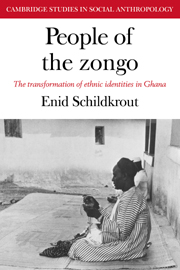Book contents
- Frontmatter
- Contents
- List of tables, figures, and maps
- Preface
- Glossary
- I Ethnicity and migration
- 1 Introduction: conceptual approaches to the study of ethnicity
- 2 The Mossi: ethnicity in Voltaic society
- 3 Migration and settlement of Mossi in Ghana
- II Kinship and community
- III Politics and change
- Notes
- Bibliography
- Index
3 - Migration and settlement of Mossi in Ghana
Published online by Cambridge University Press: 29 October 2009
- Frontmatter
- Contents
- List of tables, figures, and maps
- Preface
- Glossary
- I Ethnicity and migration
- 1 Introduction: conceptual approaches to the study of ethnicity
- 2 The Mossi: ethnicity in Voltaic society
- 3 Migration and settlement of Mossi in Ghana
- II Kinship and community
- III Politics and change
- Notes
- Bibliography
- Index
Summary
In descriptions of migration among the Mossi a distinction is often drawn between short-term, seasonal migration and the permanent emigration of individuals or families for the purpose of settling in new areas (Deniel 1968; Izard and Izard-Héritier 1959; Kohler 1972; Rouch 1956). The first involves the migration of labor, and is primarily a consequence of European colonization, while the second is a more traditional movement of population which occurs as people redistribute themselves according to the availability of resources. Seasonal and short-term migration mainly involves young men working for wages in the towns of Upper Volta or in the cocoa farms, coffee plantations, and industrial centers of Ghana and the Ivory Coast. Permanent emigration involves resettlement of families in response to poor soil fertility, dense population, and a relatively underdeveloped agricultural technology. As noted in chapter 2, this type of migration has been part of Voltaic life for centuries.
There are numerous differences between these two types of migration, including differences in the motivations and intentions of the migrants, the sex and age profiles of the two groups, and the effects of these two types of movement on the development of the economies of the Upper Volta, Ivory Coast, and Ghana. The incentives leading to both types of migration are economic, but the seasonal migrant is entering the urban or rural wage-earning economy – usually at the lowest level – while the permanent emigrants are resettling, in order to continue subsistence farming.
- Type
- Chapter
- Information
- People of the ZongoThe Transformation of Ethnic Identities in Ghana, pp. 38 - 64Publisher: Cambridge University PressPrint publication year: 1978



